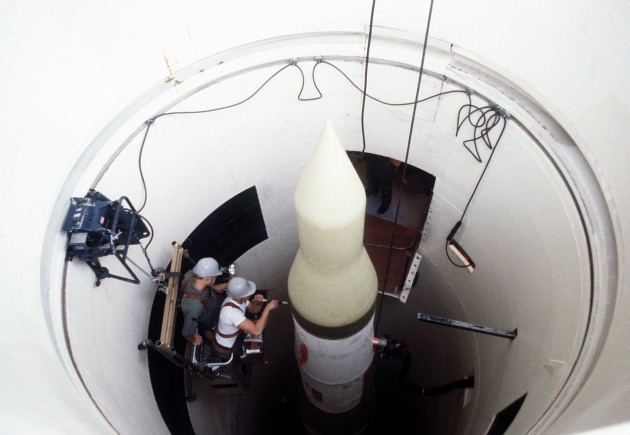Kendall: Budget Gimmicks Won’t Fix Nuclear Deterrent
Posted on

NATIONAL HARBOR: Talk about a radioactive issue. Top officials in Air Force, Navy, and the Office of the Secretary of Defense keep talking about how there is no higher priority than the nation’s nuclear deterrent. It’s so crucial, they all say, that someone else should pay for it.
“No capability we maintain is more important. <REPEAT>,” said the prepared speech that Undersecretary Frank Kendall delivered this morning at the Air Force Association’s annual conference. As the Pentagon’s top weapons buyer, Kendall must referee a game of thermonuclear hot potato: With the Pentagon budget tightening as existing nuclear weapons age, no one wants to pay the bill for replacing them.
“Some of it we hope will be a Department of Defense solution,” i.e. funding from outside the Air Force budget, said Gen. Mark Welsh, the Air Force Chief of Staff, in a roundtable with reporters yesterday at AFA. Admirals and their supporters have made similar statements that the submarine-launched deterrent needs extra funding from outside the Navy budget.
In the Air Force’s “interim POM” (Program Objective Memorandum) for the next five years of spending, currently under consideration by the Office of the Secretary of Defense, “we have redirected substantial monies within our own topline toward the nuclear mission,” added Air Force Secretary Deborah Lee James, “but…there’s more to be done, so we very much did pitch this,” i.e. the idea of getting funding for nuclear modernization on top of the expected Air Force budget.
“We’ll see how all of that comes out,” James said. “I can tell you that Frank Kendall… is quite understanding.”
What does Kendall think? “It’s a big challenge in the ’20s in particular,” he said when reporters asked him about nuclear modernization this morning. “When we get out to the [20]20s, a lot of things have to be paid for at the same time”: building new Navy nuclear missile submarines; upgrading or replacing the Air Force’s Minuteman missile; buying a new Air Force bomber; and ultimately replacing the Navy’s aging Trident missile.
So what about funding a substantial portion of those programs outside the Air Force and Navy budgets? Of course, that would cut into either the Army’s budget share or that of the agencies administered directly by the Office of the Secretary of Defense.
“There’s been some conversation about that,” Kendall said, “but at the end of the day we have to find money to pay for these things one way or another, right? So changing the accounting system doesn’t really change that fundamental requirement. We still need the money and it has to come from somewhere.”
Where “somewhere” is, however, still looks a lot like “nowhere.”
Subscribe to our newsletter
Promotions, new products and sales. Directly to your inbox.
